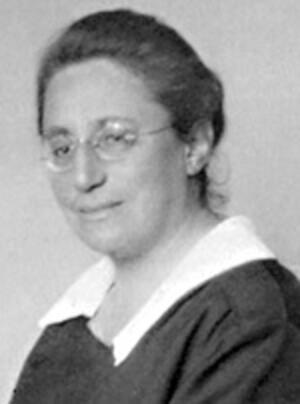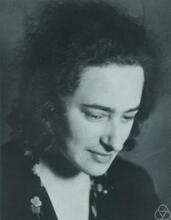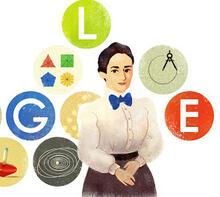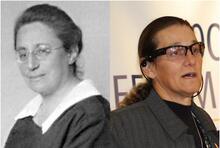Emmy Noether
Emmy Noether helped develop abstract algebra and crafted a theorem explaining the connection between symmetry and conservation laws in physics. She earned her PhD in 1907 and became a teaching assistant and unpaid lecturer, finally earning a salary in 1923. Her work was so influential that despite her father’s and brother’s contributions to the field, it was Emmy who was known informally as “der Noether.” She influenced a generation of mathematicians, several of whom borrowed heavily from her work to write the major textbooks of the field. In 1933 she was forced to leave Germany, but quickly found a new position at Bryn Mawr College and immigrated to the United States, where she remained until her early death from cancer.
Emmy Noether, a German mathematician, was the world leader in the twentieth-century development of modern “abstract” algebra. Her writing, the students she inspired, and their books wholly changed the form and content of higher algebra throughout the world.
Early Life
Noether was born in Erlangen, Germany, on March 23, 1882. Her father, Max Noether, was a professor of mathematics at Erlangen, an expert on algebraic geometry. She received her Ph.D. in mathematics from Erlangen in 1907, with a dissertation on invariant theory (involving what she later would call “computational” algebra). In 1915, she moved to Göttingen, as an assistant to the world-famous mathematician David Hilbert. There, she gave a course in his name (she was not allowed to lecture at the time on her own account) and applied her knowledge of invariant theory to relativity theory in a paper that impressed Einstein.
Career
In 1920, she turned her attention to algebra, with decisive axiomatic treatment of the theory of ideals as they apply to number theory (to factor algebraic integers) and to algebraic geometry (curves and surfaces defined by equations). She inspired many students, in particular the Dutchman B.L. Van der Waerden, who delivered brilliant lectures following her ideas and then presented them in his famous text Modern Algebra, which revolutionized the subject.
In 1941, Garrett Birkhoff and Saunders Mac Lane published an undergraduate text, Survey of Modern Algebra, which introduced the Noether view of mathematics to English-speaking students. Noether’s lectures also influenced many young French mathematicians, several of whom (André Weil, Claude Chevalley) went on to found the Bourbaki group, whose systematic treatise on all of mathematics was much influenced by Noether’s methods. She was also active in algebraic topology, a field in which she persuaded the experts (Paul Alexandroff and Heinz Hopf) to describe topological invariants not as “numbers,” but instead as algebraic objects (groups). Her own research (with Brauer and Hasse) in 1930 solved a famous problem in the theory of algebras. Her brother was also a mathematician, but Emmy Noether was so well known that she was called “der Noether.”
With the rise of Hitler in 1933, Emmy Noether was dismissed from her modest position as Ausserordentliche Professor at Göttingen—she was not only Jewish but a woman and a liberal. The Rockefeller Foundation helped to fund a position for her in the United States at Bryn Mawr College, where there was a long tradition of interest in higher mathematical research. There she was also able to travel once a week to Princeton University, to lecture there and at the Institute for Advanced Study, giving her effective access to one of the great centers of American mathematics. At Bryn Mawr, she helped various young women mathematicians. She advised Marie J. Weiss and guided the Ph.D. thesis of Ruth Stauffer (McKee). She also helped Olga Taussky-Todd, whom she had known in Göttingen.
Later Life and Recognition
Emmy Noether died on April 14, 1935, from complications following surgery. Her ideas about the abstract and conceptual approach of mathematics have been spread throughout the mathematics world by her students, her admirers, and many others who had personal contact with her. In the judgment of many, she is the greatest algebraist of the twentieth century.
Today, numerous schools and streets are named after Noether in Germany, as is the Emmy Noether campus (for mathematics and physics) at the University of Siegen and an Emmy Noether Mathematics Institute at Bar Ilan University in Israel. In a letter to the New York Times, Albert Einstein wrote: “In the judgment of the most competent living mathematicians, Fräulein Noether was the most significant creative mathematical genius thus far produced since the higher education of women began.”
Selected Works by Emmy Noether
“Beweis eines Hauptsatzes in der Theorie der Algebren.” With R. Brauer and H. Hasse. Journ. f.d. reine u. angew. Math. 167 (1932): 399–401.
“Eliminations Theorie und Ideal Theorie.” Math. Annalen 90 (1923): 177–184.
“Nichtkommutative Algebren.” Math. Zeit. 37 (1932): 514–541.
Scripta Mathematica 3:201–220, with Hermann Weyl.
Birkhoff, Garrett, and Saunders Mac Lane. A Survey of Modern Algebra (1977).
Bourbaki, N. Eléments de Mathématique (1941, 1942, 1950, 1997).
Brewer, J.W., and Martha K. Smith, eds. Emmy Noether: A Tribute to Her Life and Work (1981).
“The Late Emmy Noether: Professor Einstein Writes in Appreciation of a Fellow-Mathematician.” New York Times, May 5, 1935.
Van der Waerden, B.L. Moderne Algebra. 2 vols. (1931. Reprint 1933).






